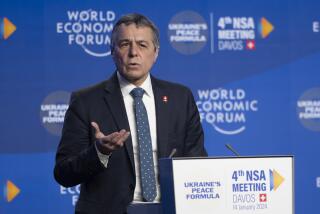Bosnia Foes Will Hold New Talks : Diplomacy: The Vance-Owen plan is revived as Bosnian Serbs promise to reconsider their rejection of it.
- Share via
UNITED NATIONS — The all but moribund Bosnian peace plan suddenly revived Thursday as the Bosnian Serbs promised to reconsider their stubborn rejection of the plan and agreed to meet with their antagonists in weekend peace talks in Greece.
Fred Eckhard, spokesman for peace mediators Cyrus R. Vance of the United Nations and Lord Owen of the European Community, announced that the talks will resume Saturday in Athens and hinted that he believes the Serbian change of mind came out of fear of some form of American military intervention.
He said that it is “impossible to separate these things” and that Vance and Owen had continually drawn the attention of the Bosnian Serbs to “the rising level of frustration in Washington” over the failure of Security Council condemnations and sanctions to stop Serbian aggression against the Muslims in Bosnia.
Pressured by leaders in Serbia, about to feel the brunt of toughened U.N. sanctions, the Bosnian Serbs announced that their self-styled legislature will reassemble on May 5 to reconsider its rejection of the Vance-Owen peace plan.
The plan, which would divide Bosnia into 10 semiautonomous provinces--three each dominated by the Serbs, Croats and Muslims plus an integrated capital in Sarajevo--has been accepted by the other parties in the war, Bosnia’s Muslims and Croats.
At the United Nations a few hours later, Eckhard announced that all the prominent players in the Bosnian civil war have agreed to attend the Athens meeting. The purpose of the session is clearly to ease the doubts of the Bosnian Serbs before they vote inside Bosnia a few days later.
But Muhamed Sacirbey, Bosnia’s ambassador to the United Nations, derided what he called the sudden “180-degree turn” by the Bosnian Serbs “to avoid military action.” He said that his government would distrust Serbian intentions even if they finally succumbed to all the pressure and signed the Vance-Owen plan.
“Concrete steps need to be taken beyond signatures,” he said.
Eckhard said that Vance and Owen hope to convince the Serbs that their security would be served by a proposed demilitarized corridor connecting Serbia with the Serbian-dominated provinces of Bosnia. The corridor would evidently function much like the road that once cut across East Germany to connect Berlin with West Germany.
The spokesman also told a news conference that Vance, a former U.S. secretary of state, and Owen, a former British foreign secretary, plan to outline a system of internationally guaranteed roadways and railways throughout Bosnia that would be open to all traffic. Local police along these routes would not even have the right to issue traffic tickets.
The leaders of all factions of the civil war plus the leaders of the most concerned other governments in the former Yugoslav federation will come to Athens, Eckhard said. They include Bosnian President Alija Izetbegovic, Bosnian Serb leader Radovan Karadzic, Bosnian Croat leader Mate Boban, Serbian President Slobodan Milosevic and Croatian President Franjo Tudjman.
Eckhard, while refusing to characterize it as a last chance, described the meeting in Athens as “the next logical step forward in a long, arduous negotiation.”
It was not clear whether the Bosnian Serbs were genuinely considering the peace plan or whether they were simply trying to head off military action by the Clinton Administration. In any case, Eckhard speculated, they decided to reconsider their outright rejection of the plan because the leaders in Serbia had “exercised the appropriate amount of influence.”
The Yugoslav news agency Tanjug said that Bosnian Serb leader Karadzic and Assembly Speaker Momcilo Krajisnik “accepted the proposal . . . to call a meeting of the parliament . . . at which all aspects of the plan would be considered in detail, including newly available information.”
But Radio Belgrade then quoted Krajisnik as saying that the Vance-Owen plan “has to be changed radically to be accepted by the Serb side.”
The Vance-Owen plan would require the Bosnian Serbs to give up almost half the territory they have conquered in a civil war that has lasted a year, with more than 100,000 people killed or missing.
Vance, who had announced his resignation as co-chairman of the peace process at the end of April, will nevertheless attend the session in Athens, Eckhard said. So will Vance’s successor, Norwegian Foreign Minister Thorvald Stoltenberg.
More to Read
Sign up for Essential California
The most important California stories and recommendations in your inbox every morning.
You may occasionally receive promotional content from the Los Angeles Times.







